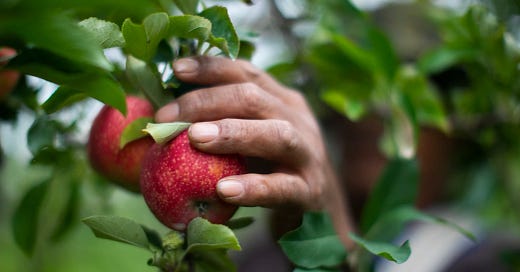GOP Congressman Blasts GOP for Doing Nothing and Colt's Owner Claims His Arrest Proves Bias Against Billionaires
Dem. strategist Donna Brazile's Racist Remarks about Vivek Ramaswamy, Cher and Barbra Streisand Threaten to Leave U.S. If Trump Wins, New: Kareem’s Movie Masterpiece Vault, Hall & Oates Sue & Sing
What I’m Discussing Today:
Kareem’s Daily Quote: Robert Frost asks us to re-examine our life goals—because we might just achieve them.
Colt’s Owner Claims Bias Against Billionaires for His Arrest: Perhaps we need to show support with “I Can’t Yacht” t-shirts. Not just tone-deaf, socially blind.
GOP Congressman Blasts GOP for Doing Nothing: He’s not wrong, but there’s no joy for the country in his admission.
Democratic strategist Donna Brazile Gets Smugly Racist about Vivek Ramaswamy: I physically cringed watching her despicable comments.
Cher and Barbra Streisand Threatens to Leave U.S. If Trump is Re-elected: At least 20 celebs made the same threat in 2016. I sympathize with their despair, but the fight is here.
Kareem’s Video Break: Get in the holiday spirit by watching one of the most touching videos ever.
New: Kareem’s Movie Masterpiece Vault: Trying something new: I’m recommending older movies worthy of being called masterpieces. Let me know if you like this feature.
Hall & Oates Sing: Hall may be suing Oates, but “She’s Gone” reminds us why they still matter.
Kareem’s Daily Quote
I am overtired
Of the great harvest I myself desired.
Robert Frost, “After Apple-Picking”
In Robert Frost’s brilliant but melancholy poem “After Apple-Picking,” the narrator has a sudden realization toward the end of his life that maybe his lifelong driving ambition (“great harvest”) was the wrong choice. He fears he squandered his life in pursuit of material success and is now left alone, without family or friends. Without love. As we come to the end of another year—when we assess our actions of the past and make promises about the future—this seems like a perfect time for a brief meditation on Frost’s quote.
There are two things about these lines worth noting. First, we look at how the orchard owner comes to this sudden harsh re-evaluation of his life. What makes a person have such a profound and disturbing judgement about their whole life? Well, he looked through a piece of ice, of course:
I cannot rub the strangeness from my sight
I got from looking through a pane of glass
I skimmed this morning from the drinking trough
And held against the world of hoary grass.
He lifts a piece of ice off the drinking trough and holds it up so he can look through it at his vast orchard. What he sees isn’t the beautiful fruition of his lifelong ambition, but a “world of hoary grass.” (Hoary means “gray or white with age.”) The icy distortion actually allows him to see his accomplishments accurately for the first time. He recognizes that his life’s work is decaying before him—as all material things must—and that he accomplished nothing of lasting value. For me, the pane of ice represents art and the power art has to make us see our world more clearly. A story, a movie, a poem, a song, a painting—they all have the power to grab us by the shoulders and shake us out of the slumber of our biases.
This rare moment of insight is when we know something is wrong and we now have the opportunity to take steps to change. There is no point to insight if we don’t use it to better our lives. Unfortunately, we sometimes don’t have the courage to change, and we sink back into the overstuffed sofa of familiarity. As Joni Mitchell sings, “I get the urge for going, but I never seem to go.”
The second aspect of the quote is about what goals we choose to pursue. How do we know we are chasing the right dream and not someone else’s dream. A few years ago, I read a poll taken of professional men and women in their mid-thirties to mid-forties. They all had college degrees or post-graduate degrees. They all had the careers they’d worked hard for and the families they’d wanted. Yet, 85% said they were unhappy. One of the greatest sadnesses is achieving one’s goal only to discover it is unsatisfying. As the old saying goes, “Be careful what you wish for, you might just get it.” Though I prefer Oscar Wilde’s take: “When the gods wish to punish us they answer our prayers.”
Add to that this recent article I read: “No. 1 life regret of dying patients: I see it ‘all the time,’ says psychology expert—what to do ‘before it’s too late’.” In the article, an in-home caregiver who takes care of people who are dying says that in their final days many of her patients express the same regret: “I wish I had the courage to live a life true to myself, not the life others expected of me.”
Our orchard owner is wondering the same thing. In his blind, fanatical drive to succeed, has he inadvertently pushed aside all the delights of life that make it fulfilling and happy? Sometimes successful people mistake the envy of others for happiness because that’s as close as they will get. To them, the facade of happiness and contentment—as thin and glossy as a staged Christmas card—is sufficient. This blindness to their own false narrative is the essence of of all tragedies. Just ask King Lear and Othello.
The choice is between being motivated by a passion for life or by a fear of the judgement of others. No wonder the orchard CEO says at the end of the poem:
One can see what will trouble
This sleep of mine, whatever sleep it is.
He worries that death (sleep) is near and that he has squandered his life in trivial pursuits. The poem is a pane of ice each of us is meant to hold against our own world and ask ourselves, “What do you see?”





